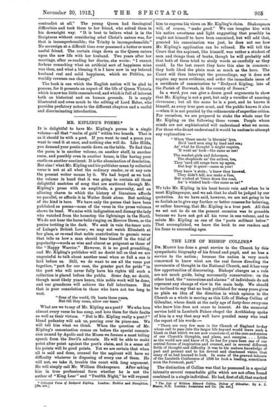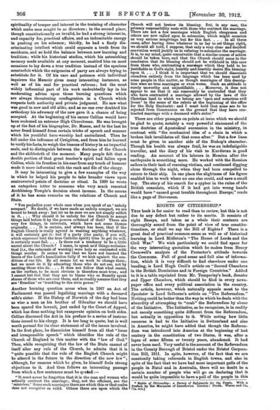THE LIFE OF BISHOP COLLINS.*
Dn. MisoN has done a great service to the Church by this sympathetic biography of his friend and pupil, and no less a service to the nation ; because the nation is very much concerned to know what are the real forces directing the movements of thought in the National Church, and it has very
few opportunities of discovering. Bishops' charges as a rule are not much guide, being necessarily conservative: on the other hand, the "excursions and alarms" of individuals do not represent any change of view in the main body. We should be inclined to say that no book published for many years gives so plain an idea of the direction in which opinion in the Church as a whole is moving as this Life of Bishop Collins of Gibraltar, whose death at the early age of forty-four everyone who knew him does not cease to lament. At the memorial service held in Lambeth Palace chapel the Archbishop spoke of him in a way that may well have puzzled many who read the report of his words :—
" There are very few men in the Church of England to-day whose call to pass into the larger life beyond would leave such a blank as that which we are now conscious of, at the core and centre of our Church's thoughts, and plans, and energies. . . . Little as the world saw and knew of it, he has for years been one of our central forces of inspiration and counsel, and in several different fields of thought and difficulty it was to his mature knowledge of past and present and to his devout and chastened vision that many of us had learned to look. In some of the gravest labours of the Lambeth Conference of 1908 he took a leading, sometimes even the foremost, part."
The distinction of Collins was that he possessed in a special intensity several remarkable gifts which are not often found combined in a single individual. He had, first of all, that marked • The Life of William Edward Collin.. Bishop of Gibraltar. By A. J. Mason, D.D. London: Lonzmans and Co. [65. net.] spirituality of temper and interest in the training of character which make men sought to as directors ; in the second place, though constitutionally an invalid, he had a strong interest in, and capacity for, practical affairs, and an indomitable energy in pushing on his schemes ; thirdly, he had a finely dis- criminating intellect which could separate a truth from its accidents, and so hold the balance between new learning and tradition; while his historical studies, which his astonishing memory made available at any moment, enabled him on most occasions to lay down a true tradition instead of the specious counterfeit which the exigencies of party are always trying to substitute for it. Of his care and patience with individual inquirers the Memoir gives many interesting instances, as well as of his zeal for practical reforms ; but the most widely influential part of his work undoubtedly lay in his moderating advice upon those burning questions which are always threatening conflagration in a Church which respects both authority and private judgment. He saw what was good in new and old alike, and as no one ever doubted his orthodoxy his advocacy of the new gave it a chance of being accepted. At the beginning of his career Collins would have been reckoned an extreme High Churchman. He was brought up at the feet of his biographer, Dr. Mason, and to the last he never freed himself from certain tricks of speech and manner which his youthful hero-worship had assimilated. Then he fell under the influence of Creighton, and from him he learned to verify his facts, to weigh the lessons of history in an impartial scale, and to distinguish between the doctrine of the Church and the shibboleth of the moment. Many people felt that a double portion of that great teacher's spirit had fallen upon Collins, while its freedom in his case from any touch of humour made it more influential with the rank and file of the clergy.
It may be interesting to give a few examples of the way in which he helped his people to take broader views upon controverted points of doctrine or ritual. In 1899 he wrote an outspoken letter to someone who very much resented Archbishop Temple's decision about incense. In the course of it he has some remarks on the relations of Church and State.
"You prejudice your whole case when you speak of an unholy compact.' No doubt, if we have made an unholy compact, we are bound to break away: but let us be sure we are not simply selfish in it. . . . Why should it be unholy for the Church to accept things laid before it by the powers ordained of God ? There are very few things, in externals, which have not come thence originally. . . . It is certain, and always has been, that if the English Church is really agreed in wanting anything whatever, it will certainly get it : but if a party (the party, if you will, which expresses best the true Catholic spirit) tries to get its will, it certainly must fail. . . . Is there not a tendency to be a little u nreal about the Church ? I mean, to speak asif things ecclesias- tical (i.e., the externals of worship) were holy as contrasted with things secular. It seems to me that we have not learned the lesson of the Lord's humiliation fully if we kick against the con- ditions of our life. By all means let us work to change them; but we must do it by educating those who do not see, not by exciting those who do. . . . It does not follow that what seems, on the surface, to be most obvious is therefore most true; and I cannot but feel that they are to blame who so fluently speak shame of those who are over them, and so readily assume that they are 'Erastian' or 'truckling to the civic power."
Another burning question arose when in 1907 an Act of Parliament was passed legalizing marriage with a deceased wife's sister. If the Bishop of Norwich of the day had been 2111 wise a man as his brother of Gibraltar we should have been spared the lawsuit, just ended by the Court of Appeal, which has done nothing but exasperate opinion on both sides. Collins discussed the Act in his preface to a series of instruc- tions issued to his clergy. It is too long to quote, but is well worth perusal for its clear statement of all the issues involved. In the first place, he dissociates himself from all that "loose and irresponsible speech" which identifies the rule of the Church of England in this matter with the "law of God." Then, while recognizing that the law of the State cannot of itself alter any rule of the Church, he admits that it is "quite possible that the rule of the English Church might be altered in the future in the direction of the new law "; although, for reasons which he gives, he himself feels strong objections to it. And then follows an interesting passage from which a few sentences must be qeoted :— "It must never be forgotten that it is the man and woman who actually contract the marriage ; they, not the officiant, are the
• ministers.' Some such marriages there are which this or that realm does not recognize as valid. Others there are upon which. the
Church will not bestow its blessing. But, in any case, the primary responsibility rests with those who contract the marriage_ There are not a few marriages which English clergymen and others are now called upon to solemnize, which might occasion us very serious misgivings but kr this fact. . . . In all these cases, after having done whatever in us lay to set things right, we should all hold, I suppose, that only a very clear and decided conviction would justify us in refusing to solemnize the marriage.. Itis, to my mind, quite conceivable that a similar course of action should be taken here and that the Church should come to the conclusion that its blessing should not be withheld in this case from those who, contracting a marsiage which they bold to be justifiable in God's sight, humbly and heartily desire His blessing upon it. . . . I think it is important that we should dissociate ourselves entirely from the language which has been used by some people in this matter, as though marriages of this descrip- tion were no true marriages or even worse. Such an attitude is surely unworthy and unjustifiable. . . . Moreover, it does not appear to me that it can reasonably be contended that they who have contracted a marriage allowed by the laws of the Christian land to which we belong are open and notorious evil livers' in the sense of the rubric at the beginning of the office for the Holy Eucharist and I must hold that none are to be rejected from Communion on the ground that they have con- tracted marriage with a deceased wife's sister."
There are other passages on points at issue which we should be glad to quote, notably a very powerful statement of the true doctrine of A.postolical succession in the ministry, in contrast with "the mechanical idea of a chain in which a. broken link invalidates all that come after." But a few lines must be given to another side of the Bishop's character. Though his health was always frail, he was an indefatigable traveller, and the diary of his visit to Kurdistan is good reading. An account of his labours in Messina after the earthquake is something more. He worked with the Russian sailors in their task of rescuing victims, and continued digging alone through the night, when they had been compelled to return to their ship. In one place the slightness of his figure enabled him to work where no one else could, and save a small boy. The story of his search for a cypher in the ruins of the British consulate, which if it had got into wrong hands would have "caused great trouble throughout Europe," reads like a page of Stevenson.



















































 Previous page
Previous page